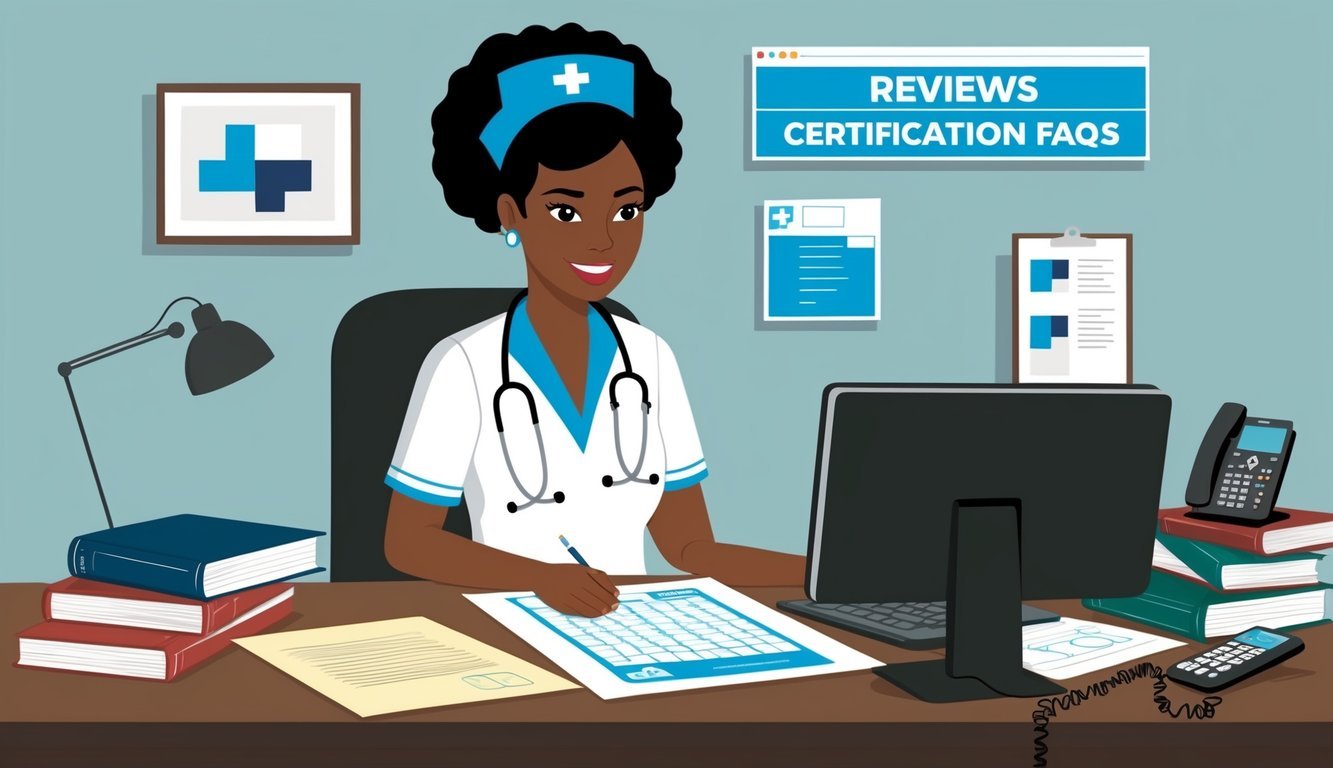As a nurse, you play a vital role in ensuring patients receive the best care possible. Becoming a certified utilization review nurse allows you to assess the quality and necessity of medical treatments.
This helps to optimize patient care while maintaining cost-effectiveness within the healthcare system.
This specialty not only enhances your skills but also expands your career opportunities in a growing field.
The process of obtaining utilization review nurse certification involves specific educational requirements and practical experience.
By completing this certification, you demonstrate your expertise in evaluating medical services and ensuring that they meet established guidelines.
This specialized knowledge can significantly impact patient outcomes and healthcare costs, making it an essential step in your nursing career.
With the increasing demand for efficient healthcare services, utilization review nursing is a promising path.
By embracing this role, you can influence clinical decisions and contribute to patient safety and satisfaction within the healthcare system.
Key Takeaways
- Certification enhances your skills in evaluating medical necessity and appropriateness.
- A solid educational foundation and nursing experience are crucial for certification.
- The demand for utilization review nurses continues to grow in the healthcare sector.
Overview of Utilization Review in Nursing
Utilization review is a critical function within nursing that focuses on ensuring effective patient care while managing healthcare costs.
Understanding the role of a utilization review nurse and the processes involved is essential for quality healthcare management.
Role and Responsibilities
As a utilization review nurse, you play a vital role in examining medical treatments and interventions.
Your primary responsibilities include assessing the appropriateness of care, ensuring that treatments align with established guidelines, and reducing unnecessary procedures.
You also collaborate with healthcare providers to gather necessary information, evaluate patient records, and determine whether proposed treatments meet criteria for coverage.
This process helps optimize resource use while ensuring patients receive the care they need.
The end goal is to enhance patient outcomes while keeping costs in check.
Importance in Healthcare Quality Management
Utilization review is essential for maintaining high standards of care in healthcare quality management.
Your work helps prevent overuse or misuse of medical resources, which can lead to better patient outcomes and significant cost savings.
By ensuring that patients receive only the necessary and effective treatments, you contribute to a more efficient healthcare system.
This approach not only improves care quality but also aligns with policies aimed at reducing healthcare costs and improving patient satisfaction.
Utilization Review Processes
The utilization review process typically involves several steps:
-
Pre-authorization: Before certain treatments or procedures, you assess whether they meet the necessary criteria for approval.
-
Concurrent review: During treatment, you monitor and evaluate the ongoing care to ensure it remains appropriate and effective.
-
Retrospective review: After treatment, you review care provided to determine if it was necessary and aligned with guidelines.
In your role, you collect data and utilize it to support decision-making.
This data-driven approach helps in refining treatment plans, improving care delivery, and enhancing overall patient outcomes.
For more details on becoming a utilization review nurse, you can check this guide.
Educational Pathways for Utilization Review Nurses

To become a utilization review nurse, you need a solid educational background and specialized training.
This includes obtaining a nursing degree and pursuing certification programs that align with your career goals.
Nursing Degrees and Programs
The first step in your journey is earning a nursing degree.
Here are the main options:
| Degree Type | Description |
|---|---|
| Associate Degree in Nursing (ADN) | A two-year program that prepares you for entry-level nursing roles. Ideal for starting your career quickly. |
| Bachelor of Science in Nursing (BSN) | A four-year degree offering a more comprehensive education. This degree is often preferred for utilization review positions. |
| Master of Science in Nursing (MSN) | A graduate degree that can enhance your knowledge and career options. Important for advanced roles in healthcare. |
Each of these programs can lead to opportunities in utilization review, but a BSN is beneficial for advancement and may be a requirement for certain roles.
Certification Programs
After obtaining a nursing degree, pursuing certification can help you stand out.
Certification options include:
- Certified Professional Utilization Review Nurse (CPURN): This credential demonstrates your expertise in evaluating medical necessity.
- Certified Case Manager (CCM): A certification that expands your knowledge in managing patient care processes.
Many organizations offer continuing education courses to help you maintain your certification.
Engaging in these programs can keep your skills current and enhance your job prospects.
Check resources like the American Nurses Credentialing Center for more certification information.
Certification Requirements for UR Nurses

To work as a Utilization Review Nurse, obtaining the right certifications is crucial.
These credentials not only enhance your skills but also increase your job prospects.
This section focuses on important certification options that are valuable for your career.
Healthcare Risk Management Certification
The Healthcare Risk Management Certification is designed for professionals seeking to improve their understanding of risk management in healthcare settings.
This certification covers essential aspects like legal risk, patient safety, and quality assurance.
Key Requirements:
- Must be a registered nurse or have a healthcare background.
- Complete a minimum of 30 hours of continuing education related to risk management.
- Pass the certification exam.
Acquiring this certification can set you apart in your role as a Utilization Review Nurse, demonstrating your commitment to minimizing risks and enhancing patient care.
For more information, you can visit the American Society for Healthcare Risk Management.
Certification in Healthcare Quality and Management
This certification focuses on quality improvement and management within healthcare organizations.
It equips you with the necessary skills to monitor and enhance patient care quality.
Key Requirements:
- Must possess a healthcare-related degree or be a registered nurse.
- At least two years of related work experience in healthcare quality.
- Successful completion of an exam that tests your understanding of healthcare quality improvements.
Holding this certification signals your proficiency in improving healthcare processes and patient outcomes.
For detailed information, refer to the Healthcare Quality Certification Board.
These certifications enhance your qualifications and provide you with valuable knowledge for a successful career in utilization review nursing.
Skills and Expertise in Utilization Review Nursing

As a utilization review nurse, you need a blend of specific skills to ensure effective patient care and compliance with medical standards.
The key areas of focus include critical decision-making, effective communication, and coordination of patient care.
Critical Decision-Making
In utilization review nursing, critical thinking is essential.
You evaluate medical records and treatment plans to decide on the appropriateness of care.
- Analyze Patient Data: Review patient histories and treatment outcomes to make informed decisions.
- Assess Compliance: Ensure that treatments meet established guidelines and standards.
Your ability to critically evaluate information helps prevent Denials from insurance providers and ensures patients receive necessary interventions.
This skill is vital for optimizing patient outcomes and reimbursement processes.
Effective Communication
Communication skills play a crucial role in your job.
You must clearly convey information to healthcare providers, patients, and insurance companies.
- Articulate Guidelines: Clearly explain the criteria for treatment approvals and denials.
- Active Listening: Understand patient concerns and healthcare provider intentions.
By maintaining strong communication, you assist in ensuring that treatments align with medical necessity.
Effective dialogue supports a collaborative healthcare environment, which is vital for achieving optimal patient care.
Patient Care Coordination
Coordinating patient care involves collaboration among different healthcare disciplines.
As a utilization review nurse, you serve as a bridge between patients and providers.
- Collaborate with Teams: Work with doctors, nurses, and social workers to facilitate care plans that meet patient needs.
- Monitor Treatment Plans: Evaluate ongoing treatments to ensure compliance and effectiveness.
Your role in care coordination helps streamline processes, reduce redundancy, and enhance patient satisfaction.
By focusing on comprehensive care, you not only meet compliance requirements but also improve health outcomes for patients.
The Professional Landscape for UR Nurses

The field of utilization review nursing is vital in today’s healthcare system.
You will find opportunities for career growth, competitive salaries, and the importance of best practices.
Job Outlook and Advancement
The job outlook for utilization review nurses remains strong.
As healthcare becomes more focused on efficiency and cost management, the demand for UR nurses is increasing.
In fact, the U.S. Bureau of Labor Statistics projects a steady growth in nursing positions, including UR roles.
Many professionals can advance their careers by obtaining certifications specifically in utilization review or related fields.
Networking and continuing education are key strategies for your advancement.
Joining professional organizations can help you stay current with healthcare trends and connect with industry leaders.
Utilization Review Nurse Salary Trends
Salaries for utilization review nurses vary by experience, location, and healthcare setting.
According to recent data, the average salary for a UR nurse is approximately $89,700 annually.
Here’s a breakdown of average salaries based on experience:
| Years of Experience | Average Annual Salary |
|---|---|
| Less than 1 year | $70,228 |
| 1-4 years | $71,167 |
| 5-9 years | $74,187 |
| 10+ years | $89,700+ |
As you gain experience, your salary is likely to increase.
Urban settings typically offer higher pay due to the cost of living and demand for specialized roles.
Best Practices and Future Challenges
To excel as a UR nurse, you should follow best practices that align with healthcare planning goals.
Advocating for patients while minimizing unnecessary services is crucial.
You should stay updated on insurance policies and guidelines to provide effective reviews.
Collaboration with healthcare teams ensures that patient care is efficient and aligned with best practices.
Future challenges may involve adjusting to new regulations and technology changes.
Embracing telehealth and other innovations while maintaining quality care will be essential as the healthcare landscape evolves.
Staying informed and flexible will help you tackle these challenges head-on.
Frequently Asked Questions

This section addresses key concerns regarding utilization review nurse certification, including requirements, costs, and daily responsibilities.
You will find specific information to support your journey into this nursing specialty.
What are the requirements for obtaining a utilization review nurse certification?
To obtain certification as a utilization review nurse, you typically need a nursing degree and a valid nursing license.
Additional requirements may include a certain amount of clinical experience in nursing, often around two years, and completion of specific training in utilization review practices.
How much does it cost to get certified as a utilization review nurse?
Certification costs can vary depending on the organization offering the certification.
On average, you might expect to spend between $300 and $600 for the certification exam and preparation materials.
There may also be costs related to renewing your certification every few years.
Can certification for utilization review nursing be obtained online?
Yes, many programs offer online certification options for utilization review nursing.
This allows you to complete study materials and exams at your convenience.
Check with programs accredited by organizations like the American Board of Quality Assurance and Utilization Review Physicians for reputable online options.
What are the recognized programs for certification in utilization review nursing?
Several recognized programs offer certification in utilization review nursing.
The American Board of Quality Assurance and Utilization Review Physicians offers a widely respected certification.
Evaluate programs based on their accreditation and the topics they cover, such as quality assurance and risk management.
How does a nurse transition into a career in utilization review?
To transition to a utilization review role, you can start by gaining experience in clinical nursing.
Look for opportunities to work in case management or risk management.
Pursuing additional training in utilization review will also enhance your qualifications and knowledge in this area.
What are the daily responsibilities of a nurse working in utilization review?
A nurse working in utilization review performs tasks such as reviewing patient cases and analyzing medical records.
They also make recommendations about the appropriateness of care.
You will also collaborate with healthcare providers to ensure that patients receive necessary services based on established guidelines.

